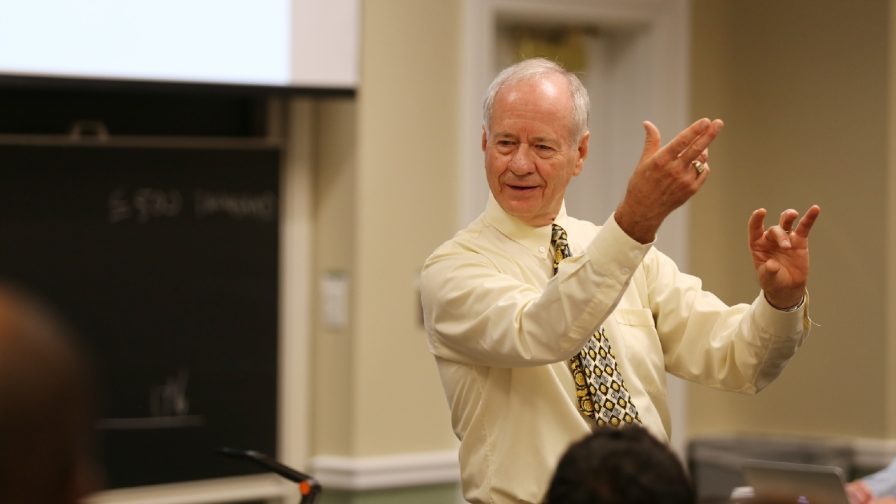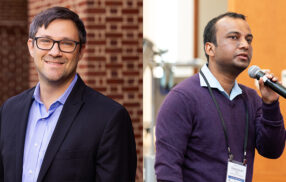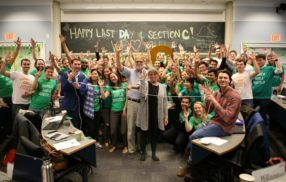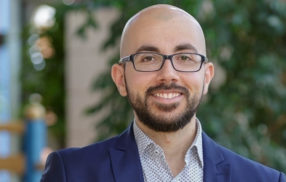
Founding Father of UVA Darden Quantitative Analysis Area to Retire After More Than 40 Years
By Dave Hendrick
University of Virginia Darden School of Business Professor Sam Bodily says he knew he would pursue a Ph.D. at age 11.
Growing up on a 600-acre farm in rural Utah, spending the bulk of his nonschool hours helping his family raise livestock and crops and sometimes spending 14 hours at a stretch on a tractor, a young person has “a lot of time to think,” Bodily said.
It was the height of the Cold War, and Bodily said he took seriously the encouragement he was hearing at school and in popular culture to devote his life to scientific advancement, lest the U.S. fall behind its rival the Soviet Union. He was attracted to the life of the mind. Plus, he knew he didn’t want to buck hay and thin beets for the rest of his life.
Bodily, who will retire from the Darden School after 43 years at the end of the current academic year, said his parents encouraged his and his siblings’ education. After graduating from high school, Bodily pursued math and then physics at Brigham Young University. Considering his path for further education, Bodily said he “learned about a thing called operations research,” and headed east to study decision analysis, random processes and optimization at the Massachusetts Institute of Technology.
Bodily, as a first-generation college grad, made good on the plans made decades prior, earning a Ph.D. The newly minted professor taught briefly at MIT and Boston University, before being contacted by Darden, which at the time seemed like an “up-and-coming program” with “a lock on the Southeast,” said Bodily.
Darden had not yet formally made Quantitative Analysis (QA) into an academic area, but did so shortly after his arrival. The QA area would grow into a robust and tight-knit group at Darden, featuring Bodily and professors including Phil Pfeifer, Robert Carraway and Sherwood Frey, all of whom would eventually collaborate on a pair of quantitative analysis textbooks.
Teaching quantitative courses via the case method could be a challenge, but once students overcame initial hurdles, they could find it fun, Bodily said. Students often expressed appreciation for the concepts and the competitive advantage the quant courses brought them.
“The challenge of the courses is that you have the art history major next to the data scientist, and you’ve got to be able to pull them all together and learn together,” said Bodily. “One of the reasons faculty stay here is the students. The students are great— it’s a real community.”
Just as the analytical classes were often a perspective-broadening experience for many Darden students, so was the Darden classroom and faculty office building for Bodily. “Often a career path for academics is to get into some particular niche and just mine that,” said Bodily. “You write the paper on a topic and then you write the next one, which pushes it a little further.”
That’s less the case among Darden faculty, given the frequent and diverse input points in which both students and peers with varied interests can quickly turn into collaborators. Cases and writing for practitioners are valued along with research articles.
At another institution, Bodily said he may have stayed focused on the then-novel work on revenue management that he posited in the early 1980s, for instance. Instead, he was given the leeway to follow his general interest in “opportunities for improving things,” and exploring various topics in strategy modeling, forecasting, lifetime consumption preferences, entrepreneurship and investment risk analysis, among other arenas.
“I would say MIT made me very narrow and deep and Darden broadened me beyond the technical,” said Bodily, who has also served as a visiting professor at Stanford University, INSEAD Singapore and the University of Washington and as a visiting research scholar at the International Institute for Applied Systems Analysis.
A 2016 paper on reducing risks and improving incentives in funding entrepreneurship, for instance, was honored as the best paper of the year in the journal Decision Analysis. He was awarded the Decision Sciences Instructional Award and several Wachovia (now Wells Fargo) Awards for Excellence in faculty research and case writing. A case on Enron and lessons learned from its fall co-authored with Professor Bob Bruner landed the pair on the front page of The New York Times business section and on The Today Show, among other outlets.
Bodily said the next chapter of his life will include his interest in investment; playing piano and other instruments; gifts to and work on charitable projects; long bike trips with his wife, Jolene; and time spent with his grandchildren. Bodily, who has been to 80 countries, said he loves to explore, to ask questions and to learn from strangers.
While his legacy will live on at Darden and in the broader world in more than 120 cases, nearly 50 research articles, multiple books and thousands of students, a planned professorship in his name will also soon begin attracting leaders who have contributed innovative methodology and practice to the field of analytics.
The professorship in analytics, which is awaiting formal approval from the UVA Board of Visitors, was supported by gifts from Bodily’s first class of students, including Arbor Investments Managing Director John Camp (MBA ’79) and former Target CFO Doug Scovanner (MBA ’79). The plan envisions a visiting professor of practice who will be brought in each year to research, write and present analytics work with global reach. The position will attract someone at the cutting-edge of the field, someone with the “best new ideas” to have an opportunity to develop and package those ideas for dissemination throughout the global community — starting at Darden.
The University of Virginia Darden School of Business prepares responsible global leaders through unparalleled transformational learning experiences. Darden’s graduate degree programs (MBA, MSBA and Ph.D.) and Executive Education & Lifelong Learning programs offered by the Darden School Foundation set the stage for a lifetime of career advancement and impact. Darden’s top-ranked faculty, renowned for teaching excellence, inspires and shapes modern business leadership worldwide through research, thought leadership and business publishing. Darden has Grounds in Charlottesville, Virginia, and the Washington, D.C., area and a global community that includes 18,000 alumni in 90 countries. Darden was established in 1955 at the University of Virginia, a top public university founded by Thomas Jefferson in 1819 in Charlottesville, Virginia.
Press Contact
Molly Mitchell
Associate Director of Content Marketing and Social Media
Darden School of Business
University of Virginia
MitchellM@darden.virginia.edu







